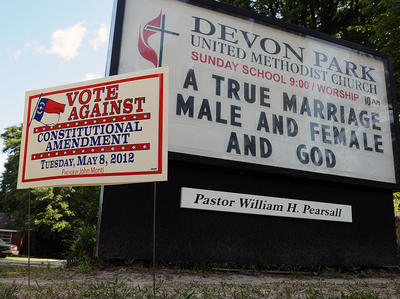Same-Sex Marriage Meets the Jim Crow South

There was an amazing list of things that a white boy growing up in Virginia wasn’t allowed to do – not in the 1950s. You couldn’t use the same restrooms as blacks, couldn’t eat at the same restaurants as blacks, couldn’t swim in the same pools or even at the same public beaches as blacks, couldn’t stay in the same hotels as blacks. And you never, ever drank from the same water fountain as blacks.
As Virginians and Southerners, we were inculcated with a belief that black people – coloreds was the term used at the time – were beyond inferior, they were physically dangerous to be near. This was simply the way we were raised. We were taught not so much loath blacks as to fear them.
Today these views seem laughable, quaint and deeply offensive. But they were real at the time, and were the law of the land in many Southern states like mine. In 1959, the state of Virginia went a step too far by closing the Norfolk city schools because one black girl had been enrolled in my high school. This was the beginning of the end of Jim Crow laws, at least in the cities. Rural Virginia remained (and may still be) a bastion of racist beliefs and actions.
I’m reminded of how odd all of this seems in the year 2012 by the vote in North Carolina to prohibit same-sex marriage. A few years from now someone is likely to write a wide-eyed, startling account of this time, noting how people’s inculcated, heart-felt beliefs did not jibe with fairness or equal rights.
What’s true about marriage is that it is a civil event that is often linked to a religious ceremony. What’s also true is that the views we sometimes hold in our hearts are irrational and formed by fear rather than logic. The argument that same-sex marriage threatens traditional marriages stands as a stark parallel to the “danger” I was taught lurked within every dark-skinned person. It is a ghost, a fiction that some find useful in protecting their turf.
I do not believe that my marriage (now 45 years strong) is in any way threatened by the existence of a same-sex relationship, and neither do I believe it to be threatened when that relationship is transformed into a marriage. Unless we plan to return to an era when any act of homosexuality is banned, we’re not going to be able to prohibit gay and lesbian liaisons – just the legal act of marriage. But oh, how important is that legal act. It provides people with rights and privileges that married couples take for granted. For example, the right to visit a desperately ill mate in the hospital is often denied without a legal marriage in place. Insurance protections and custody rights are also in jeopardy without a marriage license.
Looking back on Jim Crow Virginia in the 1950s, I find myself amazed that intelligent people could have practiced such virulent forms of racism, and that we could deny individuals their rights on the basis of unproven “facts” and emotion-laden opinions. I’m thankful that we did not take votes on these issues lest our history prove even more discomfiting.
Which brings us to the vote in North Carolina. I’m inclined to believe that people will look back on even the attempt to deny the right of two consenting same-sex adults to marry as an indictment of deep-seated prejudices based in passion rather than dispassionate thinking.
Even the state House Speaker – who backed the anti-gay marriage position – acknowledged that it is “a generational issue…. I think it will be repealed within 20 years.”
Hence the success of this effort will prove the ultimate embarrassment in future years. People should remember the South’s Jim Crow past as they contemplate its intolerant present.




